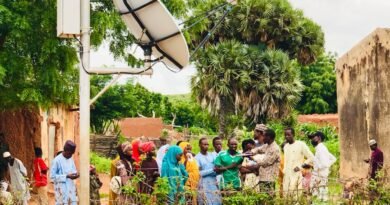Unpaid and Unheard: The Digital Exclusion of Rural Women
In a quiet farming village where agriculture is the primary livelihood, three women including 28-year-old Safiya work tirelessly on a local farm, planting and harvesting crops for wages that remain elusive.
The farm owner directs their payments to a village intermediary, rather than to the women directly. Lacking bank accounts and mobile phones, the women have no choice but to rely on this middleman, who ultimately withholds their earnings.
This exploitation is not an isolated incident; Safiya and her peers have faced similar injustices before. Their absence of digital access phones, banking, or independent communication leaves them vulnerable and marginalized.
In an era where wages are increasingly paid digitally and financial services move online, these women are left behind, voiceless, unbanked, and unpaid. Their plight highlights not only economic injustice but also a profound digital exclusion that exacerbates their suffering and denies them basic rights.
This issue is widespread. A report by the Cherie Blair Foundation for Women reveals that high mobile data costs hinder female entrepreneurs in developing countries, with 45% lacking regular internet access due to expenses and connectivity issues.
Similarly, in Nigeria, Professor Ummu Jalingo, National President of the Nigerian Economic Society, states that at least 70% of rural women lack financial inclusion, often due to a lack of bank accounts and financial literacy.
The digital divide is often discussed in terms of geography and economics, but the gender aspect is crucial. In rural areas, women’s access to smartphones and computers is significantly limited.
This lack of basic infrastructure traps many women outside the digital world. Digital marginalization is not just a technological issue but a gender rights issue that demands urgent attention.
As UN Secretary-General Antonio Guterres noted, closing the gender gap in technology and innovation is essential, as women and girls often lag in internet access and tech industry participation.
Non-governmental organizations are beginning to recognize the need for gender-sensitive digital policies. However, these efforts must extend beyond individual projects.
A collaborative approach involving stakeholders and governments is essential to bridge the digital gap and ensure rural women are included in the digital world.
Empowering these women with phones, education, digital literacy, and financial tools is crucial. Without such measures, exploitation will continue unabated, perpetuating the cycle of digital and economic exclusion.
Call to Action: Bridging the digital divide is essential for empowering rural women, promoting gender equality, and fostering economic development. Concerted efforts from all sectors are needed to ensure no woman is left behind in the digital age.
Zainab Salihu Usman, Programme Assistant (Digital Right) Centre For Information Technology And Development CITAD





